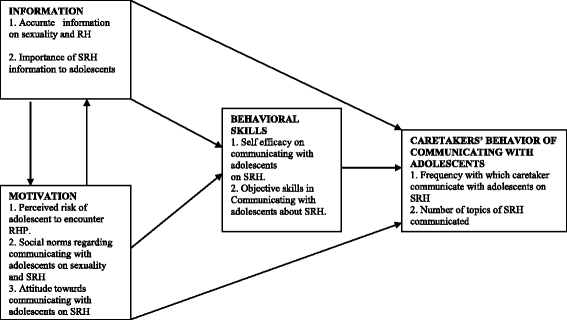Caretaker-adolescent communication on sexual and reproductive health: a cross-sectional study in Unguja-Tanzania Zanzibar
- PMID: 28720106
- PMCID: PMC5516316
- DOI: 10.1186/s12889-017-4591-2
Caretaker-adolescent communication on sexual and reproductive health: a cross-sectional study in Unguja-Tanzania Zanzibar
Erratum in
-
Erratum to: BMC Public Health, Vol. 18.BMC Public Health. 2017 Sep 22;17(1):736. doi: 10.1186/s12889-017-4709-6. BMC Public Health. 2017. PMID: 28938882 Free PMC article. No abstract available.
Abstract
Background: Caretakers/parents/caregivers/guardians play important roles in improving Sexual and Reproductive Health (SRH) of adolescents. Caretaker-adolescent sexual communication suggested to influence young people's sexual behaviours. Despite this significance, the communication is believed to be low in Unguja due to the increase of risky sexual behaviours among adolescents. This study assessed the pattern of such communication using IMB model as a framework.
Methods: This is a cross-sectional study targeted caretakers of adolescents aged 15-19. One thousand caretakers of adolescents were interviewed using structured questionnaire. Comparison between male and female caretakers on discussing different SRH topics to both sexes of adolescents was made. The mean-score difference of overall communication was examined using Univariate analysis of variance (ANOVA). Bivariate correlation and simple path analysis via regression was conducted to determine the association of IMB variables in relation to communication practice.
Results: This study finds 40.7% of caretakers had ever communicated with their adolescents on SRH matters and 9.2% reported to have had communicated in the past 30 days. The weighted topic measure revealed only 26.5% of caretakers communicated with their adolescents. Both caretakers communicated more with their female adolescents. The communication was more common between same sex and between caretakers and their biological adolescents (p < 0.000). Both male and female caretakers mostly discussed sexual abstinence to female adolescents while to male adolescents, HIV/STIs was mostly discussed by female caretakers and pregnancy by male caretakers. The least discussed topics to both sexes are safer sex and other contraceptives use. The bivariate correlations suggested that IMB constructs were inter-related and associated with communication practice.
Conclusion: Caretakers-adolescents communication on SRH in Unguja is low and it is not comprehensive. Caretakers fail to communicate with their adolescents on sensitive issues but do so on less sensitive ones. The pattern of communication found to vary across gender of caretaker and that of adolescent and depends on the nature of relationship between caretaker and adolescent. There is gender differences in selecting SRH topics of discussion. Interventions programmes have to include strategies that enhance caretaker's information, motivation and skills so as to improve SRH communication between caretakers and adolescent.
Keywords: Adolescents; Caretakers; Communication; Parents; Sexual and reproductive health; Sexuality.
Conflict of interest statement
Authors’ information
Saada A. Seif is a PhD candidate in Muhimbili University of Health and Allied Sciences, Tanzania. She is also a lecturer in the University of Dodoma, Tanzania.
Thecla
W. kohi is a lecturer in Muhimbili University of Health and Allied Sciences, Tanzania.Candida S. Moshiro is a lecturer in Muhimbili University of Health and Allied Sciences, Tanzania.
Ethics approval and consent to participate
The Muhimbili University of Health and Allied Sciences (MUHAS) Research Ethical Committee and the District Officers of six districts of Unguja, Zanzibar approved the study. Informed written consent was obtained from caretakers.
Consent for publication
Not applicable.
Competing interests
The authors declare that they have no competing interests.
Publisher’s Note
Springer Nature remains neutral with regard to jurisdictional claims in published maps and institutional affiliations.
Figures
References
-
- Seif S, Kohi T. Caretaker-adolescent communication on sexuality and reproductive health: my perceptions matter; a qualitative study on adolescents’ perspectives in Unguja-Zanzibar. Health. 2014;6:2904–2917. doi: 10.4236/health.2014.621329. - DOI
-
- Tanzania Commission for AIDS. The Adolescent Experience In-Depth: Using Data to Identify and Reach the Most Vulnerable Young People. [Online]. Available at: <https://www.popcouncil.org/uploads/pdfs/2015PGY_AdolDataGuidesTanzania20... (2015). (Accessed 3 July 2015).
-
- National Bureau of Statistics. Tanzania HIV/AIDS and Malaria Indicator Survey 2011–12. [Online]. Available at: <http://www.nbs.go.tz/nbstz/index.php/english/statistics-by-subject/healt... (2013). (Accessed 5 May 2014).
-
- Said S. Wanafunzi kulazimishwa kuolewa bado ni tatizo Zanzibar. [Online]. Available at: <https://www.unicef.org/.../SITUATION_ANALYSIS_VOL_2_ZANZIBAR(1).pdf> (2013). (Accessed 17th September 2014).
MeSH terms
LinkOut - more resources
Full Text Sources
Other Literature Sources
Medical
Miscellaneous


